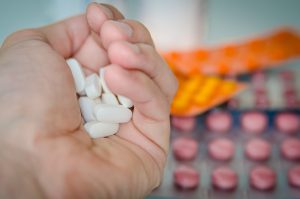We often hear “Opioid Epidemic” on the radio and read about it in the news headlines. The health field is now realizing the potential dangers of opioid pain medications and working on reducing this impact.
What are opioid pain medications?
Opioid pain medications are often prescribed to help someone manage acute pain during the days immediately following a surgery or serious injury. Opioids trigger the release of endorphins, also known as your brain’s feel-good neurotransmitters, which muffle your perception of pain and boost feelings of pleasure. 
The most common types are oxycodone, hydrocodone, morphine, codeine, heroin and fentanyl. Common drug names are Duragesic, Fentora, Hysingla, Dilaudid, Demerol, Methadone, and Oxycontin.
Opioids have the potential to become highly addictive for anyone, even if they were originally prescribed to manage acute pain. Once an opioid dose wears off, a person may find themselves wanting the good feelings from endorphins back and, over time, find themselves addicted.
There are steps each of us can take to help reduce this epidemic.
Follow Your Prescription: Opioids are effective at managing short-term acute pain, but it’s important to follow your prescription exactly. Work with your doctor to take the lowest dose possible, for the shortest time needed.
If you think you’ve developed tolerance to your opioid prescription, ask your doctor for help. Your doctor can help you identify other safe choices to manage your pain.
Store Safely: Keep your pain medications secure in a place that others cannot easily reach. If there are frequent visitors in your home, consider a locked box. Addiction can lead people to act in ways you wouldn’t think imaginable in order to obtain more of the addictive substance. And anyone may be addicted to opioids despite how well you know them and think addiction couldn’t happen to them.
Dispose of Extra Medications Safely: Once you no longer need medications, dispose of them in a safe manner. Do not flush medicines, vitamins, or other supplements down the drain unless noted on the packaging.
You can dispose of medications safely at home following the steps below. You can also download this flyer for step-by-step instructions with images.
- Remove or conceal personal information and prescription number using a black marker.
- Put an undesirable substance, such as used coffee grounds or cat litter, into a disposable container along with the medication, and mix the medicine or supplement with the undesirable substance.
- Seal the medicine mixture with lid or inside plastic bag.
- Dispose mixture and medicine container in trash, being sure to close or tie trash bag. Take trash bag out to garbage as close to garbage pick-up time as possible.
Also, look for Drug Take Back programs to dispose of extra medications such as the Georgia Prescription Drug Abuse Prevention Initiative, or find a drug disposal location near you.
Consider alternative pain management strategies.
Ask your physician if there are alternatives to taking medication for enduring pain. Opioid pain medication is only effective for short periods of time after an injury or surgery. Depending on the diagnosis, some people find relief with physical/occupational therapy, exercise, mindfulness training, cognitive behavioral therapy, acupuncture, nerve blocks or stimulation, chiropractic care, epidural catheter, injectable anti-inflammatory medication, yoga, and/or therapeutic massage. Learn more about these alternative options to manage pain.
Your doctor may recommend you visit a physiatrist or doctor of osteopathic medicine who specializes in Physical Medicine and Rehabilitation (also called PM&R physicians). Physiatrists diagnose and treat both acute pain and chronic pain and specialize in a wide variety of nonsurgical treatments for the musculoskeletal system.
Remember that addiction happens, but help is available.
An opioid drug (or another addictive drug) can take over in the brain regardless of your age. You take more and more of the medication, yet you don’t get the relief you used to receive. Thankfully, there is help available. Contact your physician or one of the following:
- Helpline for Georgia Substance Abuse: (800) 338-6745
- Georgia Crisis and Access Line: (800) 715-2325
- Opioid Treatment Providers: (770) 849-9912
Visit Empowerline for information and tools to help you manage your medications and additional resources if you are living with a chronic condition.



